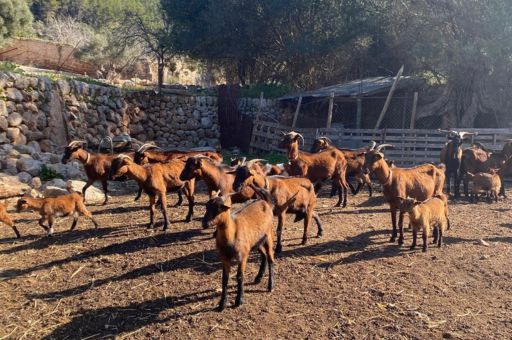The Regional Ministry of Agriculture, Fisheries and Natural Environment has closed the first purchase of 500,000 vaccines supplied by one of the two laboratories authorised by the Spanish Medicines Agency.
The doses will arrive at the beginning of December
The Directorate General for Agriculture, Livestock and Rural Development, of the Regional Ministry of Agriculture, Fisheries and the Natural Environment, today updated the data on bluetongue disease in the Balearic Islands: there are currently 78 outbreaks of serotype 8 detected throughout the archipelago (71 in Mallorca and 7 in Menorca), pending receipt of the results of other samples taken last week on other farms in the Balearic Islands.
TDB keeps you informed. Follow us on Facebook, Twitter and Instagram
A total of 78 outbreaks of bluetongue have now been confirmed in the Balearic Islands
In the case of Mallorca, the farms affected by the disease are in the municipalities of Sóller (9 outbreaks), Deià (8), Pollença and Alaró (7), Fornalutx and Bunyola (6), Campanet and Estellencs (5), Valldemossa, Escorca and Calvià (3), Esporles and Palma (2) and Felanitx, Andratx, Marratxí, Puigpunyent and Santa Margalida (1). In addition, there are other possible cases, pending the results of the samples, in the municipalities of Binissalem and Lloseta. In Menorca, there are two suspected cases in Ciutadella de Menorca and the three outbreaks declared in Ferreries and es Migjorn Gran are confirmed, in addition to the one already recorded in Mercadal. In Eivissa, the results of the samples sent are still awaited.
Vaccines
The Director General of Agriculture, Livestock and Rural Development, Fernando Fernández, has confirmed that the contract for the supply of 500,000 doses has been signed with Syva, one of the two laboratories in Spain authorised by the Spanish Medicines Agency to produce and market the bluetongue vaccine. Delivery is scheduled for early December. ‘The Directorate General has been working from the very first minute in coordination with the Ministry of Agriculture, Fisheries and Food to obtain vaccines. I can assure you that we have explored all avenues and opportunities. ‘The vaccine we have bought is a single dose for sheep, and is also effective for serotype 8 – the current and most aggressive serotype – but also for serotype 4, which will further strengthen the immunity of livestock,’ he explained.
Fernández wanted to make it clear to the sector that there are other vaccines available in other EU countries but that they do not have authorisation from the Spanish Medicines Agency, which means that ‘they cannot be purchased or administered as they do not meet the requirements or guarantee the safety of the animals’.
Finally, the Directorate General wishes to point out that until the vaccination campaign can begin, measures must be maintained to prevent further spread of the disease. These measures are regulated in a protocol that indicates the rules for the movement of livestock both inside and outside the Balearic Islands, as well as the obligation to disinfect and disinsect the animals, among others. Furthermore, until further notice, with regard to fairs, competitions and other livestock shows, movements of susceptible species for leisure or similar activities are not authorised within the seasonal period. Outside the seasonal periods, each case will be assessed on a case-by-case basis.
Fernando Fernández reminds us that this health alert has no impact on public health, as bluetongue is a viral disease that only affects ruminants.
